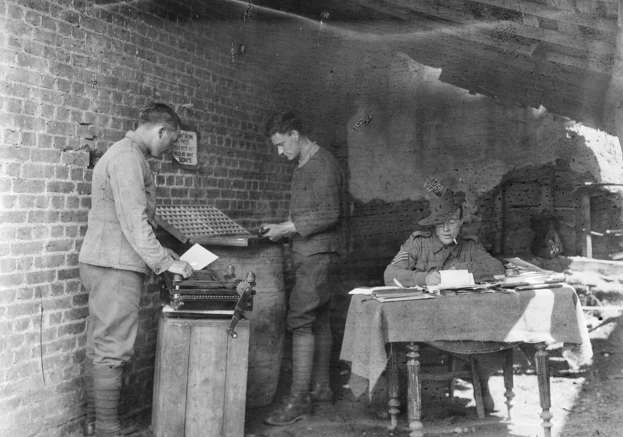Comedy in the trenches

Humour was a safety valve for trench-bound soldiers during the First World War and the language of the enemy was prime fodder, journals reveal
Published 17 November 2017
Australian soldiers, turned amateur scribes, found relief from the relentlessness of the First World War by using the language of the German enemy to entertain each other in journals written while stuck in the trenches.
From 1915-1918, trench journals were penned and distributed, often by makeshift means in the trenches themselves, as military operations stagnated into fronts. Their aim was to entertain soldiers with words and images, often depicting the enemy.

Véronique Duché, A.R. Chisholm Professor of French at the University of Melbourne, has analysed how the language of the enemy was used in humoristic trench journals.
“In the First World War, young Australians volunteered to join the Australian Imperial Force and for many of them it was their first encounter with foreign countries and languages,” she says. These soldiers had to learn not just the language of the Allies but also that of the enemy.”
A new vernacular
Twisting words in the German vernacular to create slanguage helped soldiers regain a sense of community, but it wasn’t only the Aussie diggers who played with words – French soldiers did the same thing.
“In both Australian and French trench journals, dark stories of war co-existed with cartoons, jokes and puns,” says Professor Duché, who is based in the School of Languages and Linguistics in the Faculty of Arts.
“Humour in trench journals was used as a safety valve, an outlet for these soldiers stuck in the trenches and scared.

“It provided relief and distance, particularly from the enemy. Naming ‘him’ and portraying ‘him’ as ridiculous are ways of fighting and mastering the enemy. Mocking the enemy’s language goes together with celebrating the mocker’s own national language, and this was particularly the case in French trench journals.”
These journals include Aussie magazine (1918-1919), Bochophage and Rigolboche (1915-1918). ‘Boche’ referred to German soldiers, and roughly translated Bochophage means boche-eater. Rigolboche means boche-mocker. The French army published around 500 journals during WW1.
“The Australian troops arrived on the Western Front in 1916, two years after the French had begun fighting there, but they nevertheless embraced this means of expression,” says Professor Duché.
“There certainly was some cross-pollination of ideas among all soldiers, and many units wished to publish their own humouristic journal.”
Slang to emerge from the journals include the term ‘Fritz’, which evolved from the common German name Friedrich and was often used to name the Germans as an individual. Australians would sometimes call Germany ‘Fritzland’and a German, ‘Fritzie’.
Soldiers also used the word ‘Hun’ for Germans, originally a label for the barbarian invaders from Central Asia who helped bring down the Western Roman Empire.
“’Hun’ was used frequently in propaganda and linked to negative images of Germans, while Fritz was often used in a fairly neutral way,” explains Professor Duché.
French words were also used by the Australians: boche (most common used by the French with a strong pejorative tone), and Alleyman – a phonetically rendering of ‘Allemand, a French term for ‘German’.
Different relationships with the ‘enemy’
Words portraying Germans may be similar in French and Australian journals, but the context was different. There was a long French history with the Germans, who had invaded France twice in 19th century, causing loss and trauma.
But multicultural Australia had a strong German component, with Germans occupying the largest non-British group in Victoria in 1861, at 10,000.
Australian journals adopted a less aggressive tone, and cartoons were good-natured; “Germans were not the incendiary and murderer who commits all sorts of atrocities,” says Professor Duché.
Nonetheless, French and Australian trench journals had many common strands: realistic narratives of the trenches, humour, imagination and creativity, says Professor Duché.
Key words and phrases of German propaganda were mocked in the French journals, as well as the accent. Examples include:
“Andt now I must avay be getting”
“You wish dat I sing God save ter King”
“You do nod work, you shall nod eat!”
“You have killed von man and a piece of der bomb went through my coat”
“Ach, mine friendts. You can never sometimes tell vot you least expect der most—aint it?”
Slang used in trench journals did not really influence language after war, aside from the term “Jerry”, which also popped up during the Second World War.
Trench talk, for now, remains archived for use as a valuable insight into the mindset of troops as they fought on the frontline.
“These trench publications provide an unequalled insight into everyday life and death during the Great War and reveal the mood of the time,” says Professor Duché. “There’s a fine line between balancing hate, respect, reality and propaganda.
“In describing the enemy, the authors may end up revealing more about themselves. To talk about the other is also to talk about oneself.”
Banner image: New Zealand soldiers with a copy of New Zealand at the Front, 20 Nov 1917/Alexander Turnbull Library
